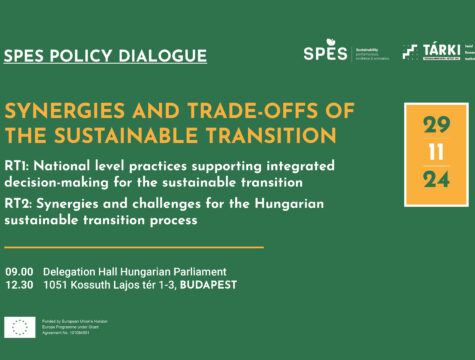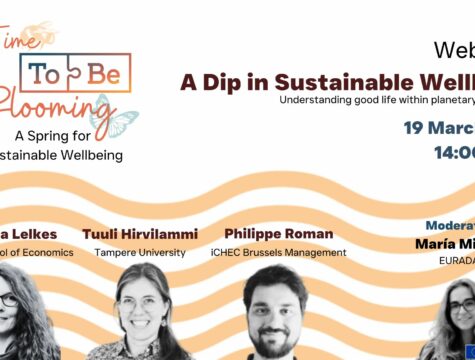In the current storm of multiple concomitant societal challenges and crises in human, environmental, economic and political domains, SPES project aims at identifying and discussing the “winds of change” that can give a direction and push the world towards a better and sustainable future for all.
How far can we measure Sustainable Human Development? Mapping of indicator systems in the SPES project and its implications
The ‘Beyond growth’ debate produced a large number of alternative measurements to GDP, although few of them describe Sustainable Human Development (SHD) as such, according to the conclusion of our mapping of existing indicator systems. Orsolya Lelkes presentation provides insights into the ongoing research of SPES Consortium Members and explains the implications for policy, innovation and de-growth paradigm change.
SPES conceptual framework of SHD builds on the two prominent paradigms of Sustainable Development (SD) and Human Development (HD) that have shaped the discourse on inclusive and sustainable development over the last decades.
As the first step, Researchers completed a mapping and assessment exercise of 44 available indicator sets and composite indices that are widely used to measure transition performances in Europe and across the world. They selected these indicator systems based on their relevance in policy-making and scientific research. They included long-standing well-known indices by international organizations, NGOs, academics (Human Development Index,Happy Planet Index, Genuine Progress Indicator), as well as novel indicators (“Beyond GDP” Sustainable Development Index). For the assessment, Researchers used the 4 pillars of SHD (productivity, equity, environmental sustainability, participation & empowerment) as benchmark criteria.
Overall, they found that only 11 out of 44 indicators cover all four pillars of SHD. They also collected information on the objective of each indicator system, their practical use, theoretical framework, unit of analysis (e.g., country, region), SDGs link, sources of data, data year(s), countries selected, as well as the time and country comparability.
As the second step, Researchers made a short-list of 15 indicator frameworks on the basis of this mapping exercise, using their assessment criteria. A more in-depth analytical assessment of the specific indicators and data infrastructure of these indicator systems followed. It included:
- a list of specific individual indicators included in each the 15 composite indicators,as well as information on these individual indicators: the data source and its type,
- as well as a methodological assessment of the composite indicators.
Researchers found that economic growth, which is a highly contested issue in their conceptual framework, seems to be treated in rather different ways. They also noticed that the underlying concepts and the applied methodologies may lead to rather diverse outcomes. In her presentation, Orsolya Lelkes discussed the implications of their findings for policy, innovation and for shifting the mainstream paradigm „beyond GDP” and beyond „green growth”.
Panel – Policy assessment, critique, and alternative proposals (20.06.2024 h16.00)
Session Chair: Catia Gregoratti
Speakers:
- Júlia Martí Comas, Debt Observatory in Globalisation, Barcelona,Spain
- Kata Fodor and Orsolya Lazányi, Environmental Social ScienceResearch Group (ESSRG Nonprofit Kft.), Budapest, Hungary
- Lukas Spatz, Justus-Liebig-University Giessen,Germany
- Jasia Tahzeeda, Philipps University of Marburg, Germany
- Catia Gregoratti, Lund University, Lund, Sweden
- Orsolya Lelkes, TARKI Social Research Institute, Hungary
The “winds of change”: the SPES framework on Sustainable Human Development
Over the past years, the sustainable development paradigm has gained a broad global consensus on which the world is building several international, supranational, national and sub-national strategies. However, the real-world scenario is still far from having truly undertaken a sustainability transition path, being a highly complex and challenging issue characterized by urgency, limited policy options and viable solutions, absence of a centralized authority, involvement of multiple stakeholders with conflicting interests, and little room for trial and error. Therefore, the current scenario urges a fundamental shift to our economic and social systems, redefining the paradigm on the connection between production dynamics, well-being and sustainability. ù
In this scenario, the general objective of this novel integrated framework for Sustainable Human Development (SHD) is to provide a clear integrated vision to sustainability transition processes to reconcile potential contradictions between economic, social, and environmental spheres. This is done by combining the global policy framework of the 2030 Agenda for Sustainable Development with the theoretical insights of the Human Development paradigm and other critical perspectives and schools of thought. Taken together, they allow for the integration of the dimensions of social, environmental, and economic sustainability into a new integrated framework–the SPES framework–identifying the pillars, driving actors and triggering factors for the transition towards SHD.
Andrea Ferrannini presented the framework and the relative paper in which SPES Researchers urges the whole global community of scholars to keep the vibrant debate on sustainability at the forefront, to guide measurement systems, research activities and policy discussion in reconciling the multiple facets of sustainability transitions, as well as to support societal actors in the systemic change towards SHD.
Panel – Political economy and political ecology (20.06.2024 h 12.00)
Session Chair: Kafi Adi Prasetya
Speakers:
- Ashwin Ravikumar,Amherst College)
- Alonso Pérez Ojeda del Arco, Independent
- Andrea Taffuri, University of Torino
- Kafi Adi Prasetya, SOAS University of London
- Wahyuwidi Cinthya, London School of Economics and Political Science
- Mario Biggeri, University of Florence
- Andrea Ferrannini, University of Florence and ARCO
- Inken Reimer, Christian-Albrechts-Universität zu Kiel
These two topics have been discussed in during two separate panel at the 10th International Degrowth Conference & 15th Conference of the European Society for Ecological Economics “Science, Technology, and Innovation beyond growth: Cultivating collective creativity for a sustainable future”, held in Pontevedra in June 2024.




